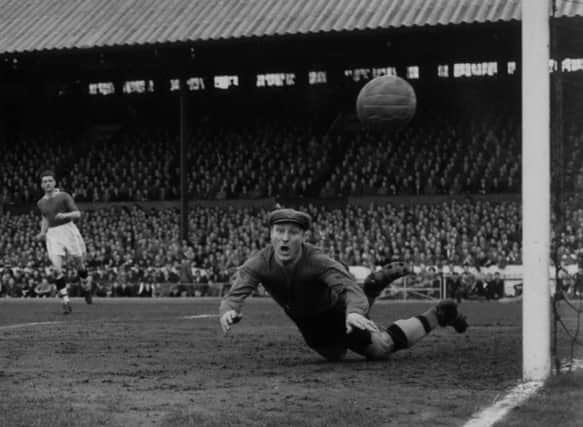Obituary: Bert Frederick Williams MBE, goalkeeper and charity fundraiser


Bert Williams is fated to be remembered as the man who kept goal for England on the day their national football team suffered its greatest humiliation.
In their group match in the Independencia Stadium in Belo Horizonte in Brazil in 1950, the USA semi-professional players defended stoutly for much of a one-sided match against the full-time English professional stars, but in the 37th minute a shot from teacher Walter Bahr was given the merest touch by the head of Haiti-born Joe Gaetjens, the ball deflecting past Williams.
Advertisement
Hide AdAdvertisement
Hide AdIt was the most shocking result in English football history, and legendary players like Tom Finney, Billy Wright, Stan Mortensen and Alf Ramsey had it on their consciences for the rest of their lives. More than 60 years later, Williams still could not hide his dismay when asked about the game, though he always expressed sympathy for Gaetjens, who was murdered by the secret police on Haiti in 1964.
Yet ironically, had it not been for Williams, it could well have been Scotland on the receiving end of the US shock. For in the match at Hampden Park which decided the 1950 Home International Championship, Williams defied Scotland with a string of superlative saves.
Scotland only needed to avoid defeat to go to Brazil as British champions, but Williams stilled the Hampden roar with his excellent goalkeeping, and England won 1-0. Fifa had said the runners-up in the Home International could also go to Brazil, but the Scottish Football Association’s blazerati sniffily said they would only go if they won the “Best of British” title. So the only humiliation in Brazil that year was England’s, as they failed to make it past the group stage and lost that game with the USA.
Williams played twice more against Scotland, being on the losing side at Wembley in 1951, and being one of three Wolverhampton Wanderers’ players in the side which thrashed Scotland 7-2 at Wembley in 1955.
By the time he played in the 1950 World Cup, Williams was already known as “the Cat” the nickname bestowed on him by the Italian press after his extraordinary performance against the Azzurri in England’s 2-0 victory at White Hart Lane in 1949.
Famed for his agility, Williams was the original “Cat”, the nickname later passed on to England goalie Peter Bonetti, while the great Russian keeper Lev Yashin was known as the Black Cat.
Yet Williams very nearly did not make it into the senior goalkeeping ranks at all. Born in Bradley, Staffordshire, and educated at St Martin’s School in the town, he began working in an engineering firm, Thompson Brothers, where he broke a finger after it was caught in a grinding machine.
His father refused to allow surgeons to remove the badly damaged digit as they wanted to do, and Williams in later life was in no doubt that, had the amputation proceeded, he would not have become a goalie.
Advertisement
Hide AdAdvertisement
Hide AdThough standing only 5ft 9ins, Williams as a teenager displayed a range of acrobatic skills and exemplary courage, and was snapped up by Walsall aged 17.
Wartime service in the RAF as a physical training instructor kept him fit and playing football, and he was picked by England for the unofficial internationals in May 1945, after turning out for Chelsea during the war.
Wolverhampton Wanderers secured his signature on demob, and he soon established himself as first-choice goalkeeper. He went on to play 381 competitive games for Wolves, and made 420 appearances in all, winning the FA Cup with them in 1949 and helping secure their first English league championship in 1953-4.
Williams gained his first full cap at the age of 29, and went on to play 24 times for England. Typically in those days, despite being an internationalist, Williams had a basic wage of £15 a week and travelled to training by bus.
The Wanderers were in their golden era under manager Stan Cullis, and Williams starred in matches against the top continental sides, friendlies that presaged the introduction of the European Cup in 1955, though England did not take part in the inaugural tournament. He played his last game for Wolves at the end of the 1956-7 season at the age of 37.
Williams’ greatest legacy as a player was found in the person of Gordon Banks, the great England goalkeeper of the 1960s and 1970s. Banks himself spoke of being inspired by Williams, and the two men were firm friends.
In retirement, Williams opened a sports shop in Bilston and also worked for an engineering firm as well as running a goalkeeping school and providing indoor cricket facilities.
Described by all who knew him as gentlemanly, Williams kept his links with Wolves and the city of Wolverhampton to his final days.
Advertisement
Hide AdAdvertisement
Hide AdWilliams was devoted to his wife of many years, Evelyn, and after she died of Alzheimer’s disease in 2002, he decided to raise funds for the Alzheimer’s Society charity in her memory. Despite being in his eighties, Williams set himself a target of raising £100,000, which he achieved, and in recognition of that work, and for his services to football, he was awarded the MBE in the Queen’s Birthday Honours List of 2010. The following year, Williams attended the opening ceremony of the Bert Williams Leisure Centre in his former home district of Bilston, Wolverhampton.
Wolves have announced that, with his family’s approval, there will be a minute’s applause to celebrate Williams before their home match against Bristol City on Saturday. His funeral will be private, but a memorial service will be held at a date to be announced.
Bert Williams is survived by his children, Annette, Vaughan and Paul, his two grandchildren and seven great-grandchildren.